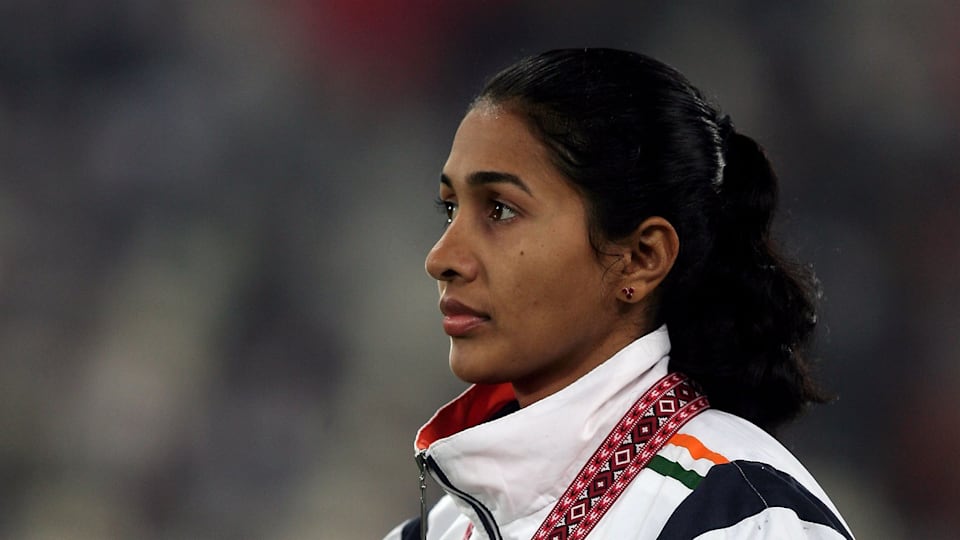A dead takeoff leg, Renal Agenesis and more - Anju Bobby George's leap to glory was built on grit!
Winner of the BBC Lifetime Achievement award 2020, the Indian athlete recalls her inspiring journey

Anju Bobby George already holds a special place in the history of Indian sport: she is the only athlete to have won a medal at the World Championship. The long jumper also won gold at the 2005 World Athletics final, the 2002 Asian Games in Busan and the 2005 Asian Championships in Incheon. And she did all of that on a dead takeoff leg.
“When I was 17 years old, I injured my takeoff leg,” Anju, who this week was conferred the BBC Lifetime Achievement Award for 2020, told the Olympic Channel.
“I did not get any proper treatment or rehab for that. I was not even able to walk it was so painful and I lost almost a year. Once I started walking, my ankle would roll inwards. I started jogging with a heavily taped ankle. And then slowly I got back to training.
“But it was not like before. It was very painful. I struggled with that ankle. As long-jumpers, we need to get a reaction from that ankle and I wasn’t getting that. The doctors were not able to identify what the problem was. I had a fracture, which was treated. But after that they were not able to figure out why I was getting constant pain.”
With the support of her coach Robert Bobby George, whom she later married, Anju was able to get back into staggered training. But the unresponsive left ankle meant that she couldn’t train for too long. “Bobby studied a lot about injury-management and rehab and customized this training for me, because I couldn’t run or jump a lot.”
During competitions, she just had to manage the discomfort as she discovered she was allergic to pain killers.
“I was admitted to the hospital two or three times with breathlessness. We later found out that it was happening because I was allergic to pain killers.”
In December 2020, more than ten years after bidding farewell to the sport, Anju made a sensational revelation. “Believe it or not, I'm one of the fortunate, among very few who reached the world top with a single KIDNEY, allergic with even a painkiller, with a dead takeoff leg.. Many limitations. still made it. Can we call, magic of a coach or his talent,” she tweeted.
The 43-year-old is now more forthcoming about the problems because she wants to continue inspiring a new generation of athletes.
“We heard about it (Renal Agenesis, rare condition where the person has a single kidney) right before the World Athletics Championships (Paris, 2003) which was one of the toughest events.
“This was just before I went to the training base. For an athlete, even a small thing is a setback. We have to be at the peak of our performance always. Because of this medical situation I was not getting proper recovery, it was painful, lot of issues after training. It was beyond our control. We did have to think about whether to continue or not. We are not medical practitioners we didn’t know how it will affect my body. We discussed it with many doctors and then decided that if something happens we’ll face it.”
Despite the blow, Anju recorded a leap of 6.70 m to win a historic bronze. It was the first, and so far only, medal an Indian athlete won at the World Championships. Though the hardships have lent Anju’s career a halo of grit, a part of her wishes she was competing in this era of advanced medical science and access to information.
“In those days, even getting the right diagnosis took a long time,” she added.
“After that also, I had only Bobby’s support. Be it my condition, recovery, massages, injury-management we were trying to get support from abroad. Nothing was available here. But now we are hiring coaches from abroad. Everything is easy and accessible now. Information is readily available; that wasn’t the case in those days.”
To make sure that youngsters now don’t have to face the same problems, Anju has started her own Academy, called the Anju Bobby George Sports Foundation in Karnataka. The academy has, for now, taken on 13 kids in the age group of 13 to 18 and look after their health, training as well as education. “They are like extended family,” she says. “Their life with us is now our responsibility.”
Anju is also a senior vice-president at the Athletics Federation of India and believes that her experience as an athlete will help in understanding the needs and problems of the younger athletes.
“Getting the Lifetime Achievement award is different from any other sports award,” she added. “It’s not just for my career but the contributions I have made after that as well. It's a recognition for my hard work that I have put in my career to give back to my country and my sport and such recognition allows us to even work harder.”
